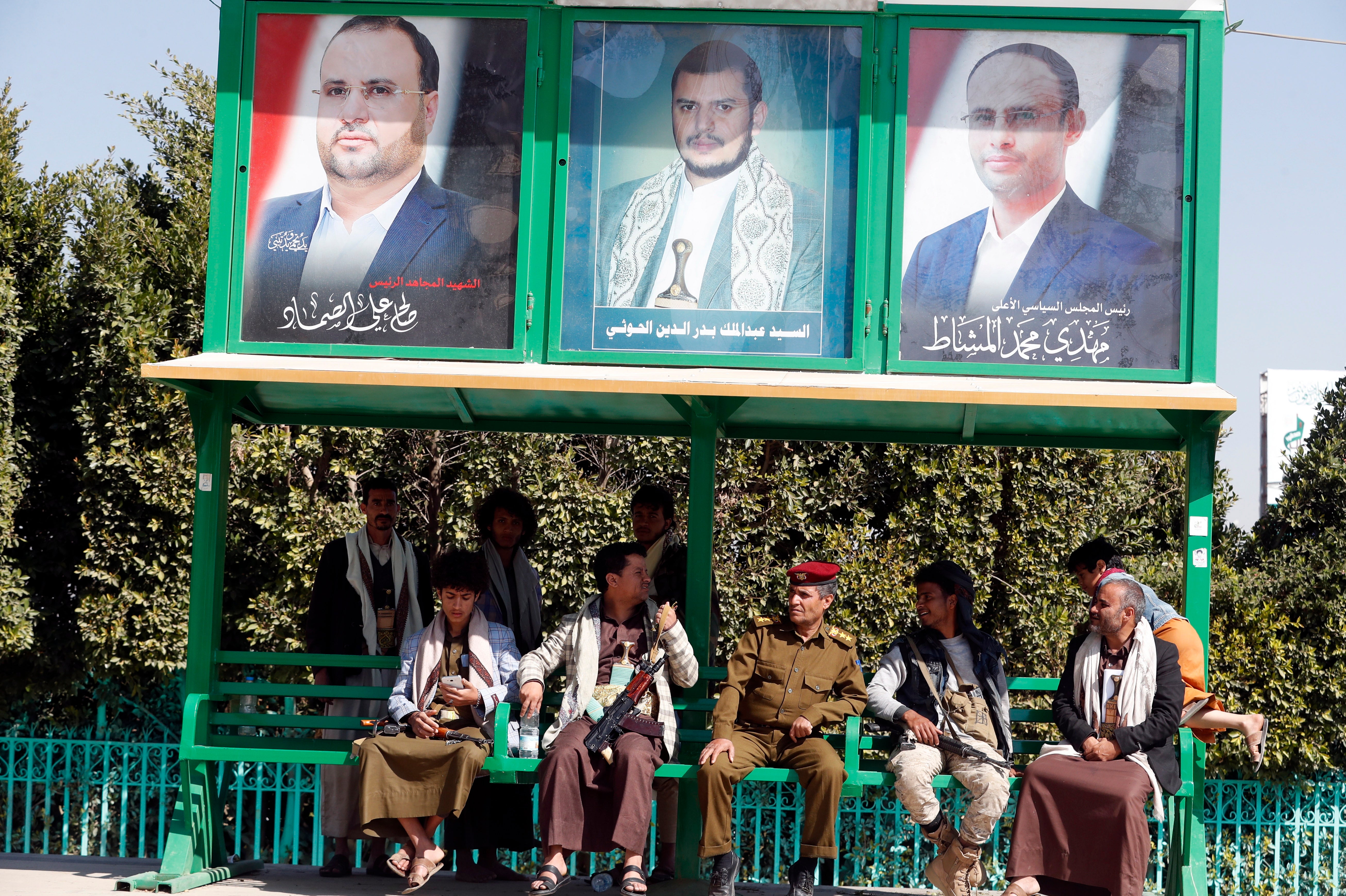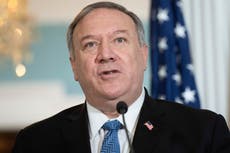‘Pure diplomatic vandalism’: Fears as Trump administration designates Yemen Houthis as ‘terrorist’ group
It is thought the decision could scupper humanitarian efforts in Yemen

The United States will designate Yemen’s Houthi rebels as a foreign terrorist organisation, in a move rights groups have warned could scupper peace efforts and choke the aid response, worsening a humanitarian crisis in the country.
Mike Pompeo, the US secretary of state, announced the plan late on Sunday, prompting calls for special safeguards to be included amid fears that sanctions could see food, fuel and medicines blocked from entering Houthi-controlled territory.
Mr Pompeo said that alongside the Iran-backed group, the US would also be designating three Houthi leaders – Abdul Malik al-Houthi, Abd al-Khaliq Badr al-Din al-Houthi, and Abdullah Yahya al Hakim – as terrorists.
Yemen’s newly formed government, whose members were injured in a suspected Houthi attack last month, said it “unwaveringly supports” the decision as a “just recourse and remedy in the interest of achieving peace”.
Using the official name for the group, Mr Pompeo said in a statement “These designations will provide additional tools to confront terrorist activity and terrorism by Ansarallah, a deadly Iran-backed militia group in the Gulf region.”
The US Treasury Department has in the past issued special licences to aid groups operating in heavily sanctioned countries.
But international relief officials have said such measures often failed to unblock aid flows as banks and insurance firms worry about running afoul of sanctions. There are also concerns the new US designation will scupper any attempts to push for peace as anyone who meets with the Houthis could be deemed collaborating with terrorists.
A Houthi leader said in a Twitter post that the movement, which has been battling a Saudi-led coalition since 2015, reserved the right to respond to any designation. The Houthis deny they are puppets of Iran.
“The policy of the Trump administration and its behaviour is terrorist,” the Houthi official Mohammed Ali al-Houthi tweeted. “We reserve the right to respond to any designation issued by the Trump administration or any administration.”
Yemen has been embroiled in a ruinous six-year civil war since the Iran-backed Houthis swept control of the country forcing recognised president Abedrabbo Mansour Hadi to flee.
Fearing the encroachment of Iran on its borders, Saudi Arabia and its Gulf allies launched a bombing campaign in March 2015 to try to reinstate the recognised government.
But there has been little hope of a comprehensive peace deal, and the conflict has only become more complicated as southern separatists within the government forces turned on their former allies and tried to declare self-rule.
The layers of fighting have sparked the world’s worst humanitarian crisis in terms of numbers. The World Food Programme has warned of an impending famine, saying by the middle of this year more than half the population of the country – or 16.2 million people – will be suffering from acute hunger.
There are concerns the terror designation will only deepen the crisis.
The move is probably part of the Republican administration’s maximum pressure strategy against Iran in the final days of Donald Trump’s presidency before the inauguration of Joe Biden, who has said he would pursue a new nuclear deal with Iran. The Axios news website reported in November that Mr Trump planned to unleash a “flood” of sanctions against Iran and its interests across the region to make the chances of reviving the nuclear deal or any kind of rapprochement less likely.
The Trump administration’s friends in Saudi Arabia and the UAE have also been demanding for months that the US designate the Houthis a terrorist organisation, and doing so may have been an unofficial enticement for some of the Gulf autocracies to sign on to the Abraham accords that normalise ties with Israel.
The UAE, Saudi and the internationally recognised Yemeni government appear to believe that designating Houthis as terrorists will give them leverage in the battlefield and in possible negotiations, isolating the militia from any potential international sponsors such as Turkey and Qatar.
“They are fed up and desperate and they think the Houthis are moving toward taking control of Yemen in the long term,” said Peter Salisbury, the Yemen researcher at the Crisis Group, a research and conflict resolution advocacy organisation.
“I completely understand why Yemenis in the anti-Houthi camp want this,” he said. “But I don’t think this achieves any of their goals. It makes the humanitarian situation worse. It likely convinces some elements of the Houthis that the only way to achieve their aims is through further military conquest. It leaves the Houthis with no international outlet other than Iran.”
Rights groups and diplomats have voiced concern that the designation will only hamper United Nations efforts to broker a comprehensive peace deal amid the Covid-19 pandemic and the collapse of the economy.
David Miliband, president and chief executive of the International Rescue Committee, called it “pure diplomatic vandalism”.
“This policy, in the name of tying up the Houthis, will actually tie up the aid community and international diplomacy,” he said.
The Norwegian Refugee Council warned that sanctions will “hamstring the ability of aid agencies to respond” and, without additional safeguards and broader exemptions for the commercial sector, will deal a “devastating blow” to Yemen’s faltering economy.
The council raised the issue of getting food and medicine into Yemen, a country 80 per cent dependent on imports, and called on Joe Biden to act upon taking office.
Human Rights Watch also warned of the “catastrophic consequences” of the designation preventing numerous non-profit and humanitarian groups from operating in areas under Houthi control, where the bulk of the country’s population lives.
Scott Paul, Oxfam America’s humanitarian policy lead, described the US move as “counterproductive and dangerous”, and urged Mr Biden to revoke the designation immediately upon taking office.
Ryan Crocker, a retired US ambassador who served in the Middle East, told Reuters the decision “serves no interest at all”. He added: “The Houthis are an integral part of Yemeni society… This is making a strategic enemy out of a local force that has been part of Yemen for generations."
The move, which was strenuously opposed by Middle East experts and specialists within the US Department of State and the USAID, also complicates any attempt by the administration of Mr Biden to alter the US policy of closely supporting the aims of Saudi-UAE coalition in Yemen. It is among numerous foreign policy landmines the Trump administration has placed in its final days.
“The executive branch applies these sanctions designations that require an active Congress to undo,” said Salisbury. “Politically it’s going to be difficult to make the case for undoing this. That doesn't mean it won’t happen.”
The foreign ministry of Yemen’s Saudi-backed government supported the designation and called for further “political and legal pressure” on the Houthis.
Yemen’s newly formed cabinet was hit by a deadly missile attack at Aden airport as its members landed in the country from Saudi Arabia nearly two weeks ago. No ministers were gravely injured but more than a dozen onlookers, aid workers travelling through the airport and members of the security forces were killed. No one has officially claimed responsibility for the attack, but the Yemen government believes the Houthis were behind it.
Yemen’s recognised foreign minister Ahmed A BinMubarak told The Independent despite the danger the cabinet was staying put in Yemen.
“It’s a challenging environment especially after the attack but we are very determined to stay and serve our people.”
Join our commenting forum
Join thought-provoking conversations, follow other Independent readers and see their replies
Comments


Bookmark popover
Removed from bookmarks